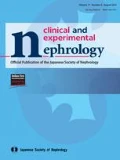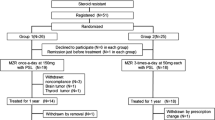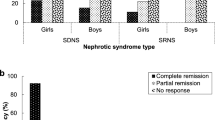Abstract
Background
Several immunosuppressants have been used to treat children with steroid-dependent nephrotic syndrome (SDNS). Mizoribine (MZR) is an immunosuppressant used to maintain remission in children with SDNS, although its effectiveness for treating SDNS remains controversial. Therefore, in this study, we assessed the clinical factors associated with children having SDNS who were successfully treated with MZR.
Methods
A total of 47 children with SDNS who underwent MZR treatment were retrospectively evaluated. Clinical features including pharmacokinetics after MZR administration were compared between MZR responders and non-responders.
Results
The comparison of the two groups revealed no significant differences in age, body weight (BW), daily dose of MZR per BW, serum concentration 2 h after administration (C2), peak serum concentration (Cmax), and area under the concentration curve 0–4 h after administration (AUC0–4). C2/(single dose/BW), Cmax/(single dose/BW), and AUC0–4/(single dose/BW) were significantly higher in the MZR responders than in the non-responders (all p < 0.01). Receiver operating characteristic analysis revealed that the cutoff values of C2 (single dose/kg), Cmax/(single dose/BW), and AUC0–4/(single dose/BW) were 0.55, 0.58, and 1.37, respectively.
Conclusions
MZR is a useful immunosuppressant for treating frequent-relapse NS in children who are susceptible to the drug. The efficacy of MZR may be associated with not only serum concentrations defined by the dosage or absorption efficiency through MZR transporters, but also the susceptibility defined by the expression level and performance of MZR transporters on the target cells.



Similar content being viewed by others
References
Noone DG, Iijima K, Parekh R. Idiopathic nephrotic syndrome in children. Lancet. 2018;392(10141):61–74.
Larkins N, Kim S, Craig J, Hodson E. Steroid-sensitive nephrotic syndrome: an evidence-based update of immunosuppressive treatment in children. Arch Dis Child. 2016;101:404–8.
Iijima K, Sako M, Nozu K, Mori R, Tuchida N, Kamei K, et al. Rituximab for Childhood-onset Refractory Nephrotic Syndrome (RCRNS) Study Group. Rituximab for childhood-onset, complicated, frequently relapsing nephrotic syndrome or steroid-dependent nephrotic syndrome: a multicentre, double-blind, randomised, placebo-controlled trial. Lancet. 2014;384(9950):1273–81.
Fujinaga S, Hirano D, Nishizaki N, Someya T, Ohtomo Y, Ohtsuka Y, et al. Single daily high-dose mizoribine therapy for children with steroid-dependent nephrotic syndrome prior to cyclosporine administration. Pediatr Nephrol. 2011;26:479–83.
Kawasaki Y, Suzuki J, Takahashi A, Isome M, Nozawa R, Suzuki H. Mizoribine oral pulse therapy for steroid-dependent nephrotic syndrome. Pediatr Nephrol. 2005;20:96–8.
Yoshioka K, Ohashi Y, Sakai T, Ito H, Yoshikawa N, Nakamura H, et al. A multicenter trial of mizoribine compared with placebo in children with frequently relapsing nephrotic syndrome. Kidney Int. 2000;58:317–24.
Kawasaki Y. Mizoribine: a new approach in the treatment of renal disease. Clin Dev Immunol. 2009;2009:681482.
Honda M. Nephrotic syndrome and mizoribine in children. Pediatr Int. 2002;44:210–6.
Uemura O, Nagai T, Ishikura K, Ito S, Hataya H, Gotoh Y, et al. Creatinine-based equations to estimate glomerular filtration rate in Japanese children and adolescents with chronic kidney disease. Clin Exp Nephrol. 2014;18:626–33.
Hosotsubo H, Takahara S, Taenaka N. Simplified high-performance liquid chromatographic method for determination of mizoribine in human serum. J Chromatogr. 1988;432:340–5.
Ishikawa H. Mizoribine and mycophenolate mofetil. Curr Med Chem. 1999;6:575–97.
Stypinski D, Obaidi M, Combs M, Weber M, Stewart AJ, Ishikawa H. Safety, tolerability and pharmacokinetics of higher-dose mizoribine in healthy male volunteers. Br J Clin Pharmacol. 2007;63:459–68.
Sonda K, Takahashi K, Tanabe K, Funchinoue S, Hayasaka Y, Kawaguchi H, et al. Clinical pharmacokinetic study of mizoribine in renal transplantation patients. Transpl Proc. 1996;28:3643–8.
Fujieda M, Ishihara M, Morita T, Hayashi A, Okada S, Ohta T, et al. Effect of single-dose oral mizoribine pulse therapy twice per week for frequently relapsing steroid-dependent nephrotic syndrome. Clin Nephrol. 2012;78:40–6.
Fujieda M, Ishihara M, Morita T, Hayashi A, Utsunomiya Y, Ohta T, et al. Effect of oral mizoribine pulse therapy for frequently relapsing steroid-dependent nephrotic syndrome. Clin Nephrol. 2008;69:179–84.
Kawasaki Y, Takano K, Isome M, Suzuki J, Suyama K, Kanno H, et al. Efficacy of single dose of oral mizoribine pulse therapy two times per week for frequently relapsing nephrotic syndrome. J Nephrol. 2007;20:52–6.
Ohtomo Y, Fujinaga S, Takada M, Murakami H, Akashi S, Shimizu T, et al. High-dose mizoribine therapy for childhood-onset frequently relapsing steroid-dependent nephrotic syndrome with cyclosporin nephrotoxicity. Pediatr Nephrol. 2005;20:1744–9.
Mori N, Yokooji T, Kamio Y, Murakami T. Characterization of intestinal absorption of mizoribine mediated by concentrative nucleoside transporters in rats. Eur J Pharmacol. 2008;586:52–8.
Fukao M, Ishida K, Sakamoto T, Taguchi M, Matsukura H, Miyawaki T, Hashimoto Y. Effect of genetic polymorphisms of SLC28A1, ABCG2, and ABCC4 on bioavailability of mizoribine in healthy Japanese males. Drug Metab Pharmacokinet. 2011;26:538–43.
Minuesa G, Purcet S, Erkizia I, Molina-Arcas M, Bofill M, Izquierdo-Useros N, et al. Expression and functionality of anti-human immunodeficiency virus and anticancer drug uptake transporters in immune cells. J Pharmacol Exp Ther. 2008;324:558–67.
Nakajo A, Khoshnoodi J, Takenaka H, Hagiwara E, Watanabe T, Kawakami H, et al. Mizoribine corrects defective nephrin biogenesis by restoring intracellular energy balance. J Am Soc Nephrol. 2007;18:2554–64.
Author information
Authors and Affiliations
Corresponding author
Ethics declarations
Conflict of interest
The authors have declared that no conflict of interest exists.
Ethics approval
All procedures performed in studies involving human participants were in accordance with the ethical standards of the institutional and/or national research committee at which the studies were conducted (IRB approval number HM18-119) and with the 1964 Helsinki Declaration and its later amendments or comparable ethical standards. This article does not contain any animal studies performed by any of the authors.
Informed consent
Informed consent was obtained from all individual participants included in the study.
Additional information
Publisher's Note
Springer Nature remains neutral with regard to jurisdictional claims in published maps and institutional affiliations.
About this article
Cite this article
Kondoh, T., Ikezumi, Y., Yokoi, K. et al. Assessment of factors associated with mizoribine responsiveness in children with steroid-dependent nephrotic syndrome. Clin Exp Nephrol 23, 1154–1160 (2019). https://doi.org/10.1007/s10157-019-01754-1
Received:
Accepted:
Published:
Issue Date:
DOI: https://doi.org/10.1007/s10157-019-01754-1




